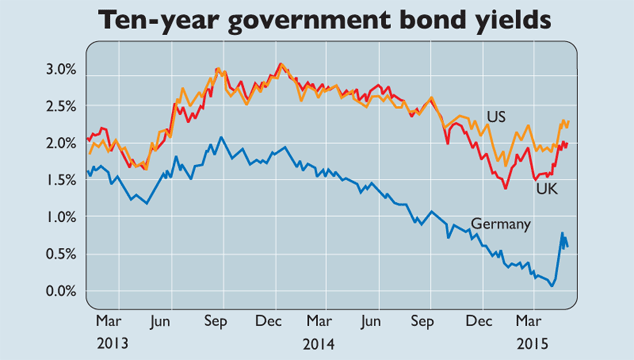Is the bond bull market over?
Government bonds may be overpriced, but there's life in the bubble yet.

Get the latest financial news, insights and expert analysis from our award-winning MoneyWeek team, to help you understand what really matters when it comes to your finances.
You are now subscribed
Your newsletter sign-up was successful
Want to add more newsletters?

Twice daily
MoneyWeek
Get the latest financial news, insights and expert analysis from our award-winning MoneyWeek team, to help you understand what really matters when it comes to your finances.

Four times a week
Look After My Bills
Sign up to our free money-saving newsletter, filled with the latest news and expert advice to help you find the best tips and deals for managing your bills. Start saving today!

"We can all be caught up in the mood of the moment," says Capital Economics. "But talk of a rout' in the global bond markets is, at best, premature." The recent jump in ten-year UK, US and German bond yields reflecting falling prices looks "dramatic". The German ten-year bund yield soared from 0.07% in mid-April to a high of 0.8%; this week it has fallen to around 0.6%. But the moves were smaller than 2013's jump in yields the so-called taper tantrum.And that was ultimately reversed.
It's certainly too early to call the end of the bond bull market that began with the defeat of inflation in the early 1980s, agrees John Authers in the Financial Times. German yields are still lower than ever seen before December 2014. And the rise in yields may not continue.
The European Central Bank (ECB) may have convinced markets that it has done enough to avert deflation. But that's not the same as convincing them that the recovery is entrenched, which would imply higher yields (and so lower bond prices). Bund yields "still signal deep negativity" about Europe, says Authers. And the ECB is still hoovering up bonds with printed money.
MoneyWeek
Subscribe to MoneyWeek today and get your first six magazine issues absolutely FREE

Sign up to Money Morning
Don't miss the latest investment and personal finances news, market analysis, plus money-saving tips with our free twice-daily newsletter
Don't miss the latest investment and personal finances news, market analysis, plus money-saving tips with our free twice-daily newsletter
What could change the outlook? The US ultimately sets the tone for bonds. If it raises interest rates sooner than expected, or seems to be behind the inflation curve, yields could surge. But how long, as Ambrose Evans-Pritchard wonders inThe Daily Telegraph, could the world economy cope with a spike in yields before it "sets off a chain of nasty consequences, and ultimately defeats itself"?
Overall debt has hit a record 175% of GDP in emerging markets and 275% in developed ones. Emerging markets have racked up $4.5trn in dollar debt. That makes economies vulnerable to dearer US money. "There comes a point when [the interest-rate rise] is too fast and too vicious, and starts to hit earnings. That is when we could get an equity sell-off," says Andrew Roberts of RBS.
Corporate debt looks just as overpriced and as precarious as equities, whose boom "is already long in the tooth and reliant on record margin debt", says Evans-Pritchard. Turbulence would send investors back to bonds, and may even mean more quantitative easing. Yields would fall again. So while it's perfectly possible that we've seen the absolute peak of the multi-decade bond bull market, "don't bank on it".
Get the latest financial news, insights and expert analysis from our award-winning MoneyWeek team, to help you understand what really matters when it comes to your finances.

-
 MoneyWeek Talks: The funds to choose in 2026
MoneyWeek Talks: The funds to choose in 2026Podcast Fidelity's Tom Stevenson reveals his top three funds for 2026 for your ISA or self-invested personal pension
-
 Three companies with deep economic moats to buy now
Three companies with deep economic moats to buy nowOpinion An economic moat can underpin a company's future returns. Here, Imran Sattar, portfolio manager at Edinburgh Investment Trust, selects three stocks to buy now